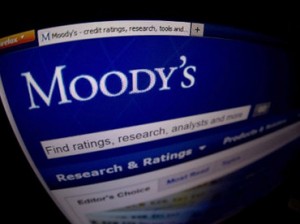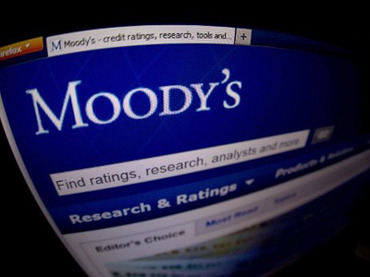
(AFP Photo)
Credit rating institution Moody’s Corporation has announced it expects the Egyptian economy to grow by approximately 4.5%, by the end of fiscal year (FY) 2014/2015. Moody’s raised Egypt’s credit rating to B3, and assured stable outlook for the economy, according to Investment Minister Ashraf Salman, who expected positive impacts for Egypt.
Egypt expects its economy to grow roughly be 4.3% during FY 2014/2015, backed by financial, monetary and legislative reforms.
Prime Minister Ibrahim Mehleb said, following a meeting with the Board of Directors of Egyptian Financial Supervisory Authority (EFSA): “Fortunately, this meeting coincides with Moody’s announcement regarding raising the credit rating of Egypt to B3, as well as expectations that the growth rate next period in Egypt will be higher than what we planned for.”
This is Mehleb’s first meeting with the EFSA’s Board of Directors. The authority is responsible for organising and supervising non-banking financial activities.
“Our meeting, on Tuesday, assured that funding and insurance are the lifeline of any business,” Mehleb said, according to a cabinet statement. “The government is keen to provide and develop financial services and tools in order to meet the needs of mega projects.”
“The government is keen on developing the micro-finance system, insurance as well as real estate financing, which serves a wide number of citizens,” he said. “We are coordinating with the EFSA in order to develop the structure of markets and non-bank financial services in Egypt and to expand the range of benefits so that it reaches various classes of the community.”
Egypt’s constitution is almost unique worldwide in stating the independence of the authority along with the independence of the Central Bank of Egypt (CBE) which supports the credibility of the supervision upon all financial activities in Egypt, he added.
By the end of 2014, the market value of the shares in the Egyptian Stock Exchange (EGX) exceeded EGP 500bn, an increase of 17% from the previous year. In 2014, the trading value of the listed and unlisted stock reached roughly EGP 323bn, an increase of 70% from the previous year. In the insurance sector, last year’s instalments rose to EGP 14bn, an increase of 12%, and investments of the insurance companies reached EGP 49bn, according to Sherif Samy, Chairman of EFSA.
Similarly, private insurance funds increased to EGP 40bn. Last year, financial leasing witnessed a leap of 14% to reach a total of contracts of EGP 7bn. The real estate fund provided by the companies also grew by 18% and the factoring activity increased by 13%, to reach EGP 3.7bn.
The first Egyptian criteria, prepared by the EFSA as well as some experts in the field, were reviewed for real estate evaluation. These criteria provide a methodology agreed upon for real estate evaluation to confirm objectivity of evaluations and to support its credibility, he added.
The real estate evaluation criteria are essential in various aspects of the financial activity, including financing, real estate guarantees or real estate investment funds. They are also essential in real estate financing and financial leasing companies, in addition to the insurance business through insurance coverage of the estate or whatever is associated to providing real estate as in-kind quota in the companies’ capital, according to Samy.



